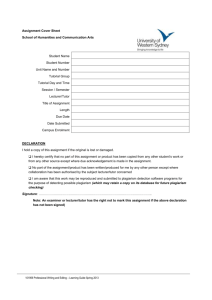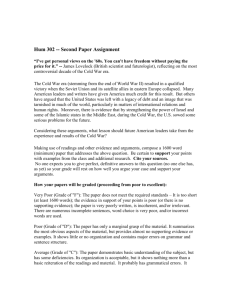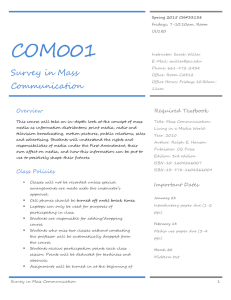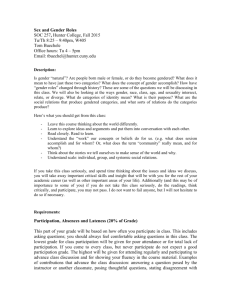Instructor: Van Nguyen-Marshall Office: Lady
advertisement
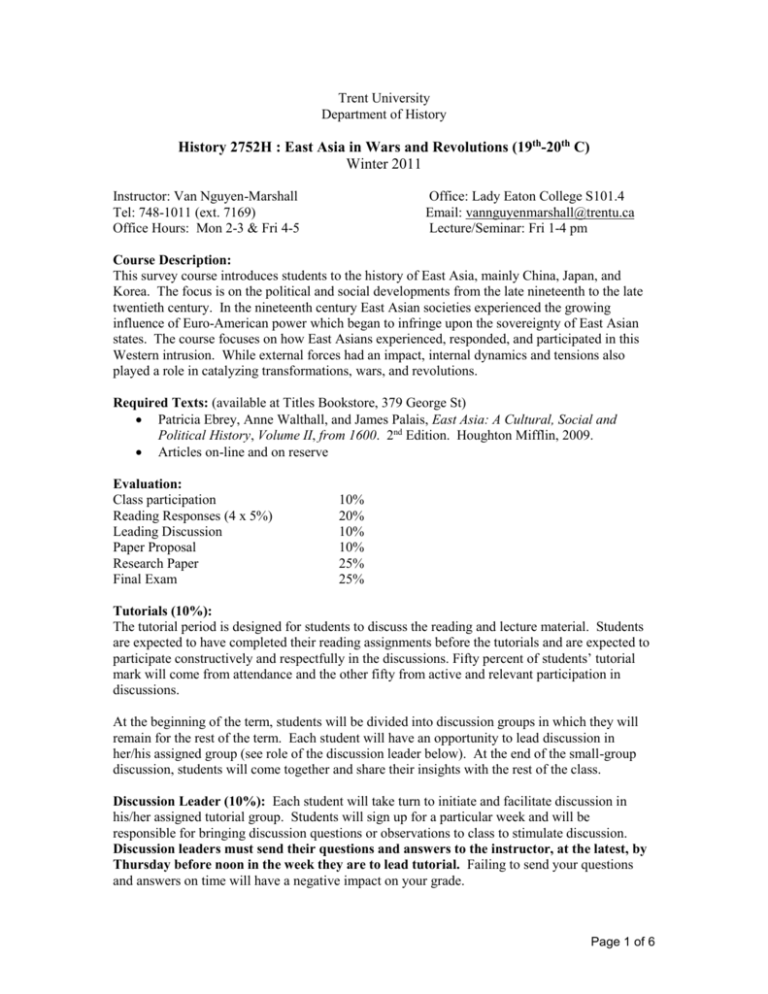
Trent University Department of History History 2752H : East Asia in Wars and Revolutions (19th-20th C) Winter 2011 Instructor: Van Nguyen-Marshall Tel: 748-1011 (ext. 7169) Office Hours: Mon 2-3 & Fri 4-5 Office: Lady Eaton College S101.4 Email: vannguyenmarshall@trentu.ca Lecture/Seminar: Fri 1-4 pm Course Description: This survey course introduces students to the history of East Asia, mainly China, Japan, and Korea. The focus is on the political and social developments from the late nineteenth to the late twentieth century. In the nineteenth century East Asian societies experienced the growing influence of Euro-American power which began to infringe upon the sovereignty of East Asian states. The course focuses on how East Asians experienced, responded, and participated in this Western intrusion. While external forces had an impact, internal dynamics and tensions also played a role in catalyzing transformations, wars, and revolutions. Required Texts: (available at Titles Bookstore, 379 George St) Patricia Ebrey, Anne Walthall, and James Palais, East Asia: A Cultural, Social and Political History, Volume II, from 1600. 2nd Edition. Houghton Mifflin, 2009. Articles on-line and on reserve Evaluation: Class participation Reading Responses (4 x 5%) Leading Discussion Paper Proposal Research Paper Final Exam 10% 20% 10% 10% 25% 25% Tutorials (10%): The tutorial period is designed for students to discuss the reading and lecture material. Students are expected to have completed their reading assignments before the tutorials and are expected to participate constructively and respectfully in the discussions. Fifty percent of students’ tutorial mark will come from attendance and the other fifty from active and relevant participation in discussions. At the beginning of the term, students will be divided into discussion groups in which they will remain for the rest of the term. Each student will have an opportunity to lead discussion in her/his assigned group (see role of the discussion leader below). At the end of the small-group discussion, students will come together and share their insights with the rest of the class. Discussion Leader (10%): Each student will take turn to initiate and facilitate discussion in his/her assigned tutorial group. Students will sign up for a particular week and will be responsible for bringing discussion questions or observations to class to stimulate discussion. Discussion leaders must send their questions and answers to the instructor, at the latest, by Thursday before noon in the week they are to lead tutorial. Failing to send your questions and answers on time will have a negative impact on your grade. Page 1 of 6 Reading Responses (4 responses = 20%) Students are required to submit four (4) written responses to tutorial questions, which are found in the weekly schedule below. Of these four responses, three must be submitted by Mar 4th. These are to be submitted on the day the material is discussed. The answers should be no more than two pages, doubled spaced, and typed. These responses will be graded on content and style. Make sure to provide proper references for your answer. As one of the purposes of this assignment is to encourage students to prepare for their tutorial discussion, no extensions will normally be given. Paper Proposal (10%)—due Feb 18th Length: 5-6 pages (double spaced, 12 point, Times Roman font). The proposal should include: A brief description of your topic. This should be written in a formal essay format with attention to grammar and organization. You should have done some research and have (at a minimum) basic knowledge of your topic at this point. Furthermore, you should have a tentative thesis and title formulated. As you are required to do some research for this proposal, make sure to provide proper documentation for your work (see section on documentation below). Bibliography (of at least 10 scholarly sources such as monographs, articles, or primary sources) You will be marked on the originality, clarity, and organization of your proposal, as well as the sources you find for your bibliography. Research Paper (25%) Due April 1st Length: 3500 words (appx 12 pages, double spaced, 12 point, Times New Roman font) This research paper must be an analytical (as opposed to a descriptive) examination of an historical question or issue in East Asian history. The paper must have a clear thesis and students are expected to provide evidence to substantiate their argument. Papers should be based on at least 12 scholarly sources (popular websites, encyclopedias, dictionaries, and news magazines are not considered scholarly sources). All these sources should be cited in your paper and not just listed in your bibliography. You are advised to keep good research notes, as you are required to include your research notes when you submit your final paper. Failing to submit research notes or submitting inadequate research notes will negatively affect your paper grade. More detailed instructions regarding your paper will be provided after proposals have been graded. Documentation: For all your writing assignments, please make sure to document your work in the Chicago Style (footnotes and Bibliography). For a guide on this style, see the “Documentation Guide” on the Academic Skills Office’s website: http://www.trentu.ca/academicskills/documentation/chicago.php Final Exam: during the official exam period (25%) The final exam will open book, whereby students can bring their notes and readings (in paper form) to the examination. The exam will consist of short-answers and essay questions and will allow students an opportunity to review and synthesize the material learned in the course. Page 2 of 6 Use of Laptop and other electronic devices: Students may use laptops in the class only for note taking during the lecture. All laptops must be put away during the tutorial period. If you have a learning disability and require a laptop for note taking, please talk to me. If it comes to my attention that students are using their laptops for extracurricular activities, then they will not be allowed to use laptops thereafter. If you have special circumstances that warrant keeping your cell phone on (such as being parents to young children or a health professional on call), inform me in advance. Otherwise, make sure all communications and electronic devices are turned off during class. Any form of electronic communication, including text messaging, is not allowed in the class. Policies for Due Dates for Paper Proposal and Research Paper: Assignments are to be submitted to the instructor in class on the day they are due. Since you already know the deadlines for all your assignments, please make sure to organize your work schedule accordingly. Unless you have a documented medical or family emergency, please do not ask for an extension. If you can’t meet the deadline, the penalty is simply: 3% per day, including weekends. One week after the due date, no papers will be accepted, unless you have a written medical excuse or documented family emergency. This is not negotiable. Academic Integrity Academic dishonesty, which includes plagiarism and cheating, is an extremely serious academic offense and carries penalties varying from failure in an assignment to suspension from the University. Definitions, penalties, and procedures for dealing with plagiarism and cheating are set out in Trent University's Academic Integrity Policy which is printed in the University Calendar. Plagiarism: Essays are to be original works produced by you specifically for this class. In other words, you cannot submit an essay that has been used or is intended to be used for another class. If for some reason you would like to pursue research that is closely related in topic to another paper, please talk to me before you proceed. According to the Trent University calendar: “Plagiarism is knowingly presenting words, ideas, images, data, or any other form of work of another person (including essays, theses, lab reports, projects, assignments, presentations and posters) in a way that represents or could be reasonably seen to represent the work as one’s own. “Knowingly” includes ought reasonably to have known. Plagiarism includes failure to acknowledge sources correctly and submitting materials copied from the internet without proper acknowledgement of the source. Draft work submitted for evaluation is subject to the same standard as final work.” (Trent Calendar, 2009-10) Penalties for plagiarism may range from mark deduction on an assignment to academic suspension from the university. This instructor has a low tolerance for plagiarism and will penalize to the full extent those caught. If you are unsure of what constitutes plagiarism, please talk to me or consult the document “Avoiding Plagiarism and Good Writing Techniques” on the Academic Skills’ Website: http://www.trentu.ca/academicskills/integrity.php Access to Instruction: Trent’s policy toward accessibility: “It is Trent University’s intent to create an inclusive learning environment. If a student has a disability and/or health consideration and feels that he/she may need accommodations to succeed in this course, the student should contact the Disability Services Page 3 of 6 Office (BL Suite 109, 748-1281, disabilityservices@trentu.ca) as soon as possible. Complete text can be found under Access to Instruction in the Academic Calendar.” Jan 14 Introduction Jan 21 East Asia before the 19th C Readings: East Asia [textbook]: o Chapter 18. China in Decline (1800-1900) o Chapter 20. Meiji Transformation (1868-1900) Question: What were some major challenges that China and Japan faced in the mid to late 19th c? Jan 28 Reforms and Revolutions in China Readings: Fan Hong and Mangan, J. A, “'A Martyr for Modernity: Qui Jin - Feminist, Warrior and Revolutionary,” International Journal of the History of Sport 18, no. 1 (2001): 27-54 [EBSCOhost] East Asia: Chapter 24. Remaking China (1900-1927). Question: What does Qui Jin’s life reveal about Chinese society at the turn of the 20th c? Feb 4 Imperial Japan and Colonial Korea Readings: Sandra Wilson, “The discourse of national greatness in Japan, 1890-1919,” Japanese Studies 25, no. 1 (May 2005): 35-51. [online journal in Topcat] East Asia, Chapter 22. Rise of Modern Japan (1900-1931) Question: According to Sandra Wilson, what factors led to the rise of the notion of national greatness in Japan? Feb 11 Communism and Civil War in China Readings: Michael Lynch, Mao. Routledge, 2004, ch. 4. [ebook] East Asia: Chapter 25. War and Revolution, China (19271949). Question: How does Lynch explain the success of the CCP? Feb 18 Japan and the Second World War Readings: Sheldon Garon, “Luxury is the Enemy: Mobilizing Savings and Popularizing Thrift in Wartime Japan,” Journal of Japanese Studies 26, 1 (Winter 2000): 41-78 [online journal in Topcat] East Asia: “Connections: World War II” and pp. 442-445 in Chapter 26. War and Aftermath in Japan (1931-1964). Page 4 of 6 Question: How were Japanese civilians on the home front mobilized for war? Paper Proposal Due Feb 25 READING BREAK Mar 4 China under Mao Readings: Lynch, Mao, ch. 7. [ebook] East Asia: Chapter 27. China Under Mao (1949-1976). Question: How does Lynch explain the Cultural Revolution? Mar 11 Students should have submitted at least 3 reading responses by Mar 4th. The Korean War Readings: Dong Choon Kim, “Forgotten War, Forgotten Massacres: The Korean War as Licensed Mass Killings,” Journal of Genocide Research 6, No. 4 (December 2004):523-544. [EBSCOhost] East Asia: Chapter 29. Korea (1945 to the Present). Question: Summarize Kim’s argument. [Mar 11: Final date to withdraw from Winter-term courses without an academic penalty] Mar 18 A Divided Country: North and South Korea Readings: Charles Armstrong, “Familism, Socialism and Political Religion in North Korea,” Totalitarian Movements and Political Religions 6, No. 3 (Dec 2005):383–394. [EBSCOhost] Chang, Paul, “Unintended Consequences of Repression: Alliance Formation in South Korea’s Democratic Movement (1970-1979),” Social Forces 87, issue 2 (Dec2008): 651-677. Question: Using these two articles, briefly describe North and South Korean societies. Page 5 of 6 Mar 25 Japan since the Second World War Readings: Roger B. Jeans, “Victims or Victimizers? Museums, Textbooks, and the War Debate in Contemporary Japan,” The Journal of Military History 69, no. 1 (Jan., 2005), pp. 149-195 [JSTOR] East Asia: Chapter 30. Contemporary Japan (1965 to the Present). Question: What is Roger Jeans’s main argument? Apr 1 Post-Mao China Readings: Wang Zheng, “Call me Qingnian but not Funu: A Maoist Youth in Retrospect.” Feminist Studies 27, no. 2 (Spring 2000): 9-34. East Asia: Chapter 28. China Since Mao Research paper Due Apr 8 No Tutorial or Weekly Question East Asia in the 21st C Reading: Doobo Shim, “Hybridity and the rise of Korean popular culture in Asia,” Media, Culture & Society 28, no. 1 (2006): 25-44. No Tutorial or Weekly Question Page 6 of 6

